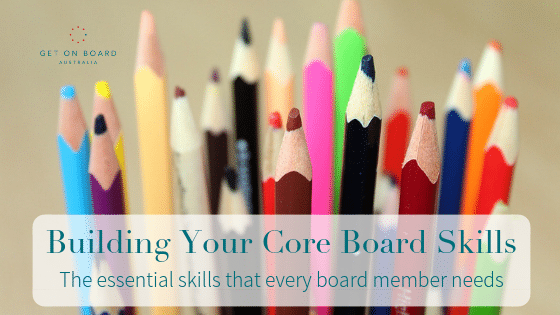Building Your Core Board Skills

In surveying board recruiters, the feedback they gave was overwhelming – they want to see you demonstrate business acumen, strategic awareness, and financial understanding.
Anyone in any role in any business can – and should – understand how their role fits into the overall organisational landscape and how they contribute to the achievement of the organisation’s strategic goals and bottom line.
It’s important to build this knowledge – in addition to your professional competence – for your leadership ambitions and for your board participation.
Susan Colantuono, in her book No Ceiling, No Walls, provides an equation to consider the elements you should focus on if you have leadership aspirations:
Professional Competence + People Skills + Business Skills = Higher Leadership Positions
Yes, you will need to contribute from time-to-time in your zone of excellence (e.g. law, accounting, HR, marketing, fundraising, etc.); however, most of the time you are required to take a broader view of the organisation and have to consider all angles of an issue and the broader implications of decisions you are deliberating. You’ll sometimes hear this referred to as “taking the 10,000 ft view of the organisation”.
So, how do you start building your business, strategic, and financial acumen? Let’s look at each one individually and some techniques you can adopt to build your awareness and understanding in these areas.
First, a quick look at some definitions. When consulting dictionary.com we see that Awareness relates to: the state or condition of being aware; having knowledge; consciousness. On the other hand, Acumen refers to having: keen insight; shrewdness. Often these terms are used interchangeably. For what it’s worth, my perspective is that you need to first develop your awareness in order to build acumen. The techniques that follow will help you to develop both awareness and acumen across business, strategic, and financial elements of the business.
If you’re looking to easily gain broad skills development across each of these, I can highly recommend two books to read (suitable for everyone):
• Execution: The Discipline of Getting Things Done by Bossidy, Charan, and Burck
• No Ceiling, No Walls: What Women Haven’t Been Told About Leadership from Career-Start to the Corporate Boardroom by Colantuono
Take the learnings from these books and look for examples / applications in your workplace and/or in your current board placement(s).
Building Business Awareness
Having business awareness (or, ‘business acumen’ or ‘business smarts’) is understanding how a business operates, makes money, and grows profitably. Susan Colantuono describes it as “having an instinct for making money and exploiting business opportunities”.
Learn the business of running the business – how it makes cash, how it grows, how it generates a return, and how it serves the customer. These are the outcomes that every role in an organisation impacts in some way.
• Consider including these elements in future professional development investments.
• Read widely on each of these elements to gain a deeper understanding.
• At work, ask your boss or a trusted peer to help you better understand each of these elements in play within the organisation.
• Keep each of these components in mind as you listen to or read updates and reports from your boss, the CEO, and/or the board.
Growing Strategic Awareness
Strategic awareness blends with business awareness and begins to look across and outside of the organisation for trends, opportunities, and threats that need to be considered and acted upon within the organisation for its continued success.
MAP Consulting suggest the following ways to build your strategic awareness:
• Read about strategy (see recommendations above).
• Consider building a strategy for your job role and execute on it.
• Find a role model to learn from.
Harvard Business Review make the following recommendations to growing your strategic awareness:
• Observe and seek trends (within and beyond your profession and industry)
• Ask tough questions to broaden perspective and thinking.
• Sound strategic – focus conversations on higher-level outcomes, rather than on the tactics.
• Make time for thinking and reflection.
• Embrace positive conflict through robust, candid conversations.
Developing Financial Awareness
Money makes the world go around, and this is certainly the case in any organisation. No money means no business. On a board you can’t avoid financial conversations, so it’s worth making the effort as early as possible to get comfortable with the numbers and understanding the story that they tell about the organisation’s health.
Harvard Business Review have a great article for non-financial professionals. It serves as a great starting point and makes the following suggestions:
• Don’t be scared of the numbers. More exposure and greater understanding will grow your comfort level.
• Focus on key metrics, rather than trying to know it all, all at once.
• Learn the language of finances and financial reports (for example, profitability, EBITDA, operating income, revenue, operating expenses, etc.).
• Understand the balance sheet.
• Play with the numbers to see how changes in one area can affect another.
• Find a mentor to educate you on the financial aspects of the organisation.
• Make it personal. Try to get a picture of your personal role and the financial impacts / implications it has or can have to the business.
• Connect the numbers back to the organisation’s strategy: what story are the numbers telling you?
Our article about developing your boardroom financial skills can help you further.
Investing into developing these skill areas will help you as you grow into greater leadership positions within an organisation, and will help you immensely in your board career. If you can blend these skills with your professional skills, you will start to become a powerful business leader and standout board member.
